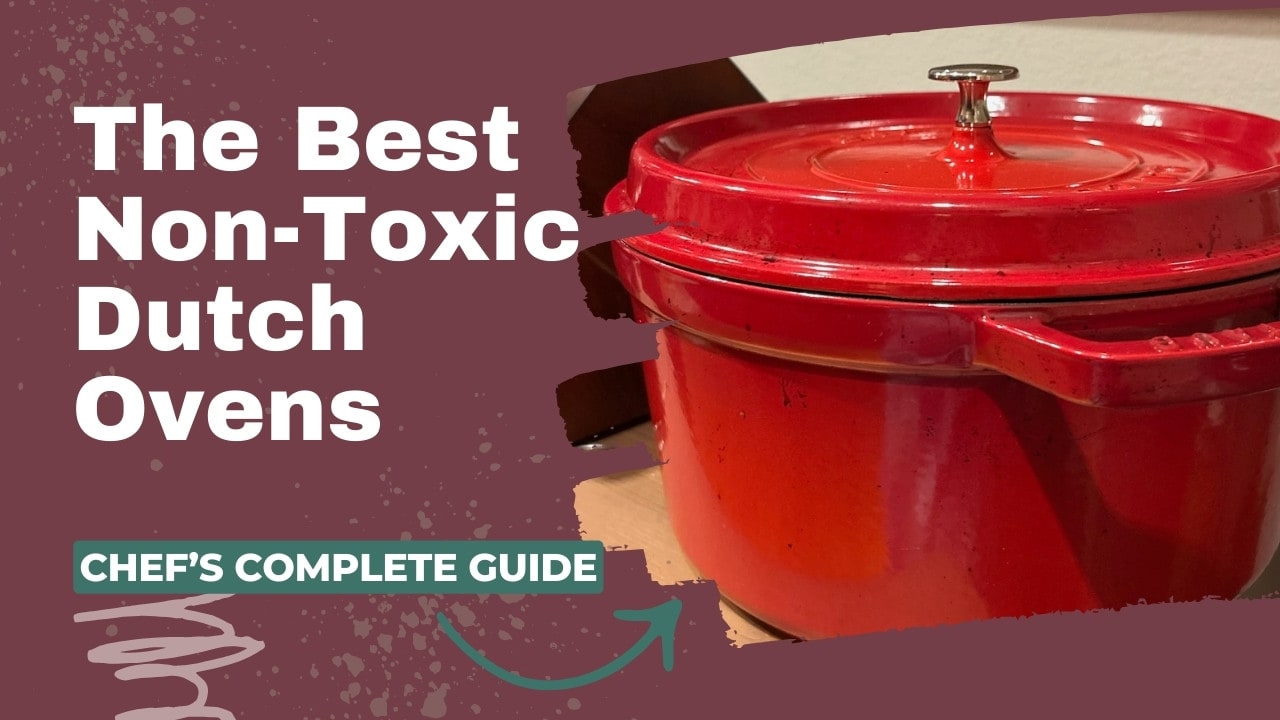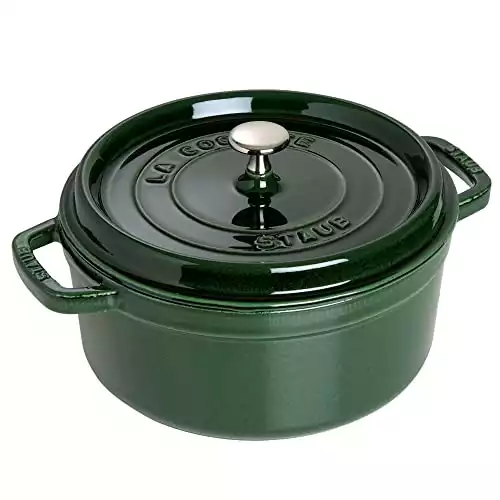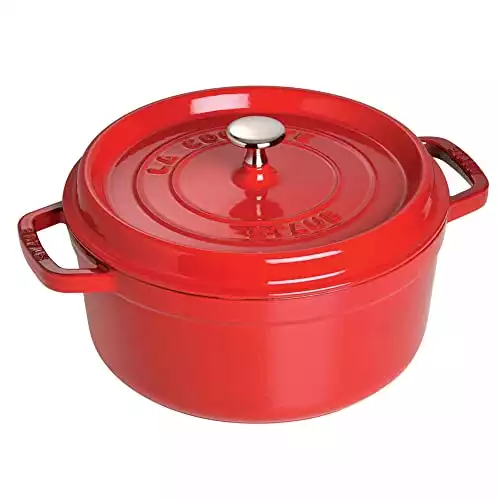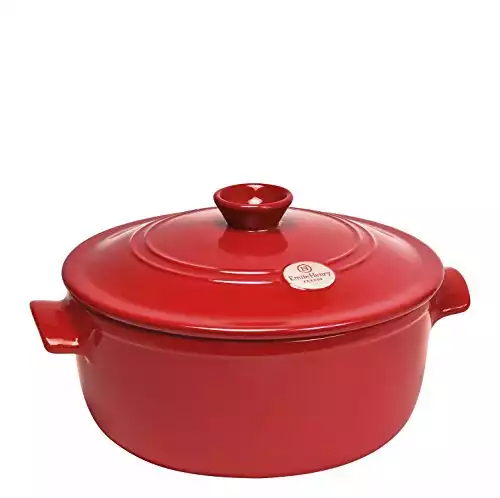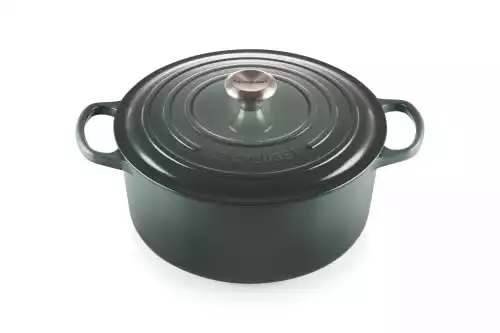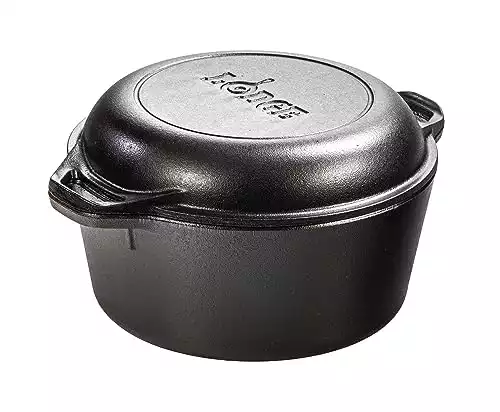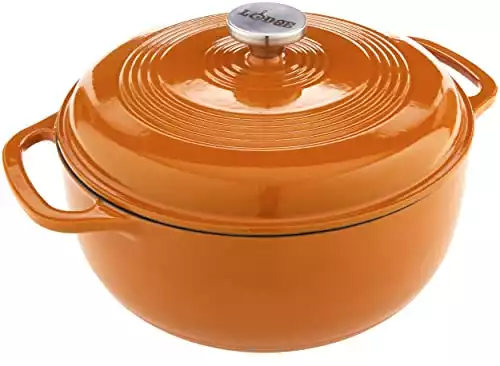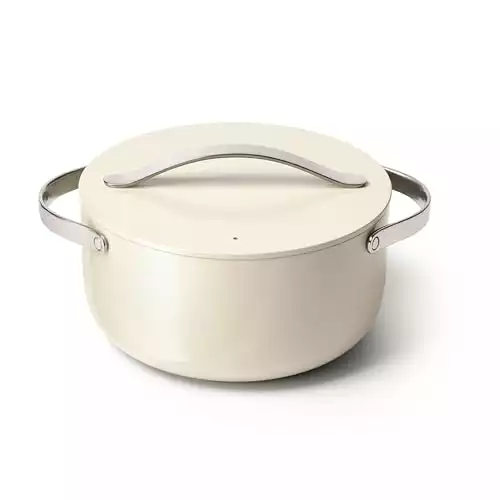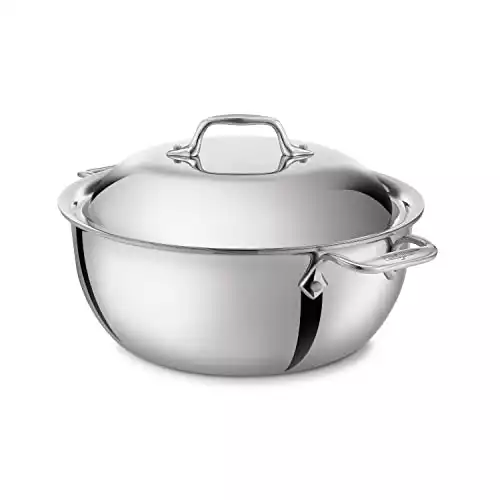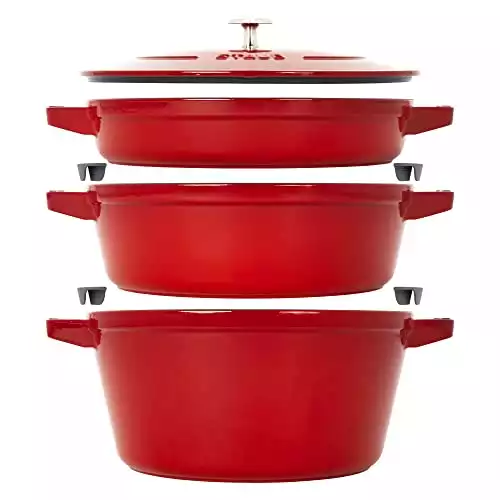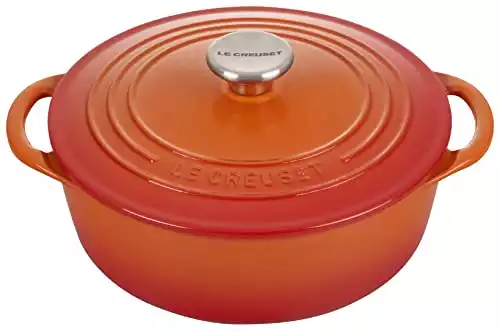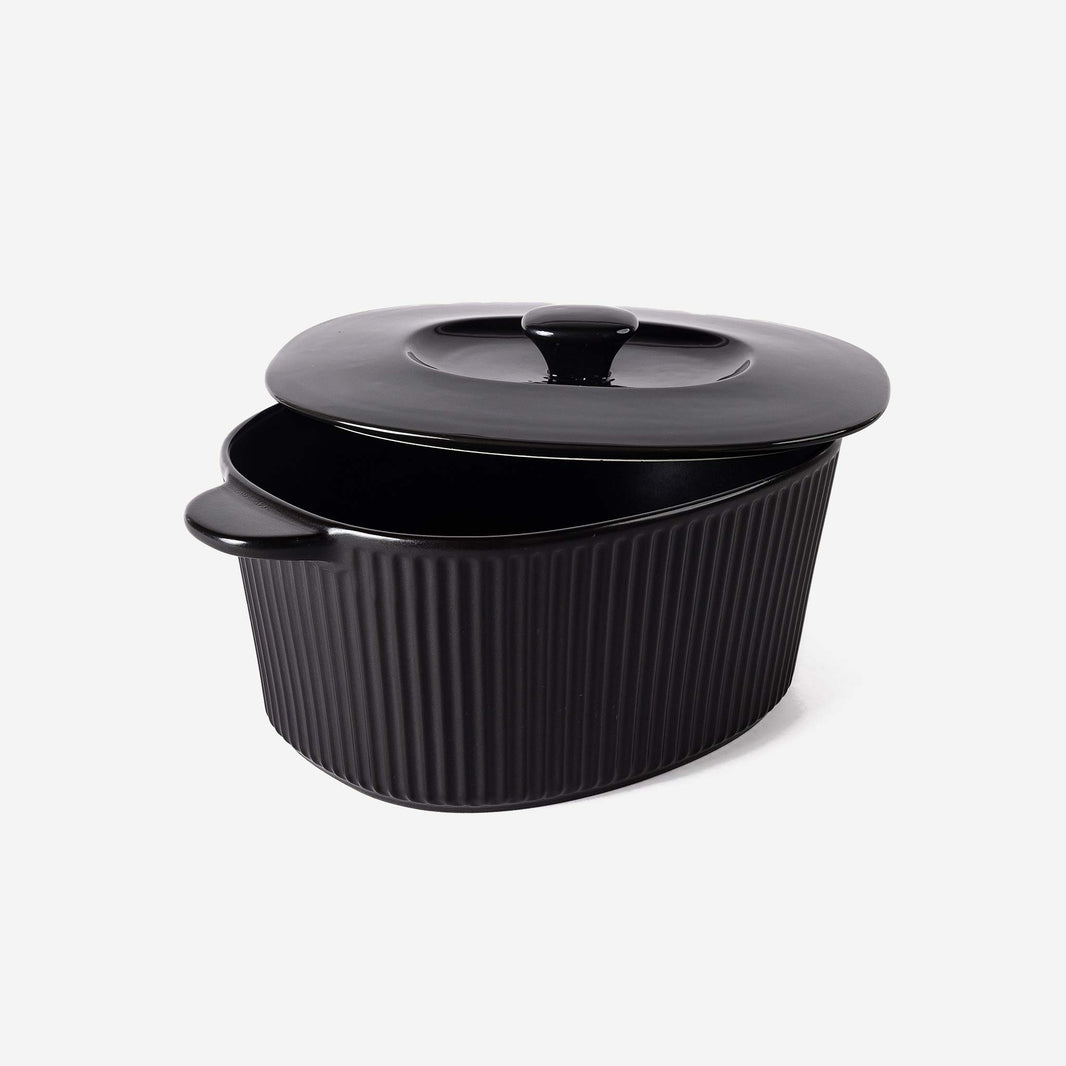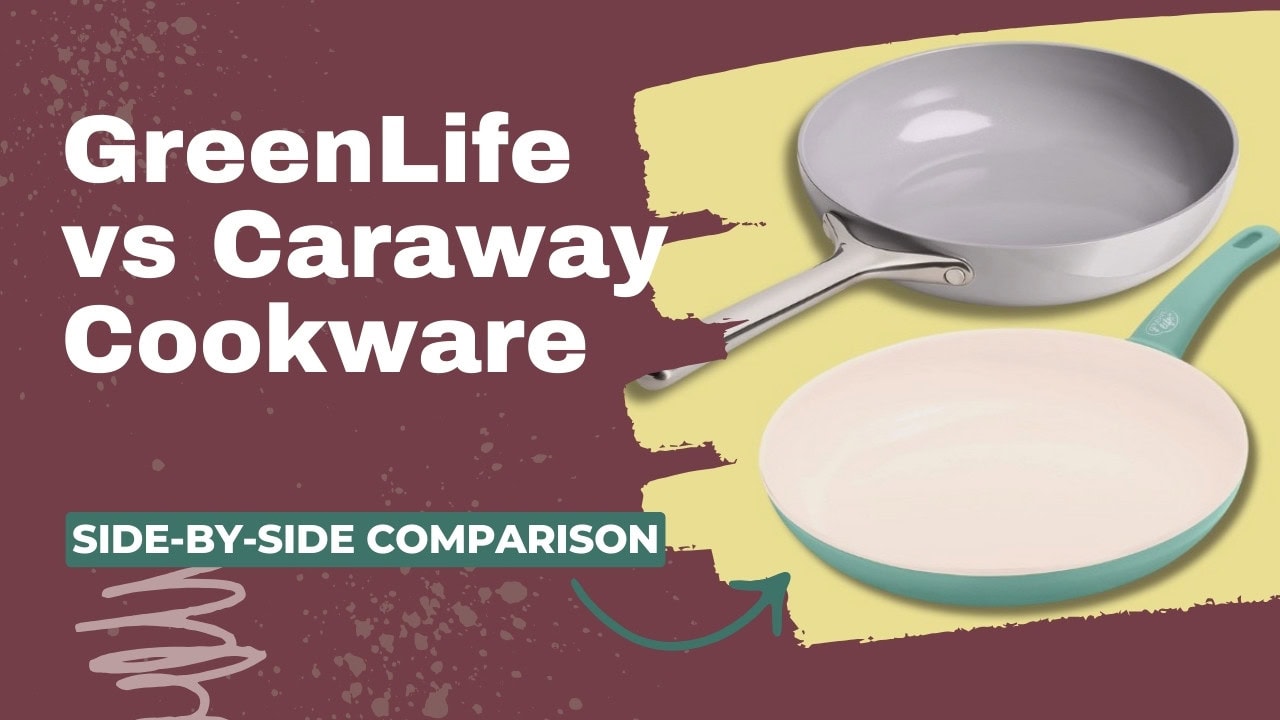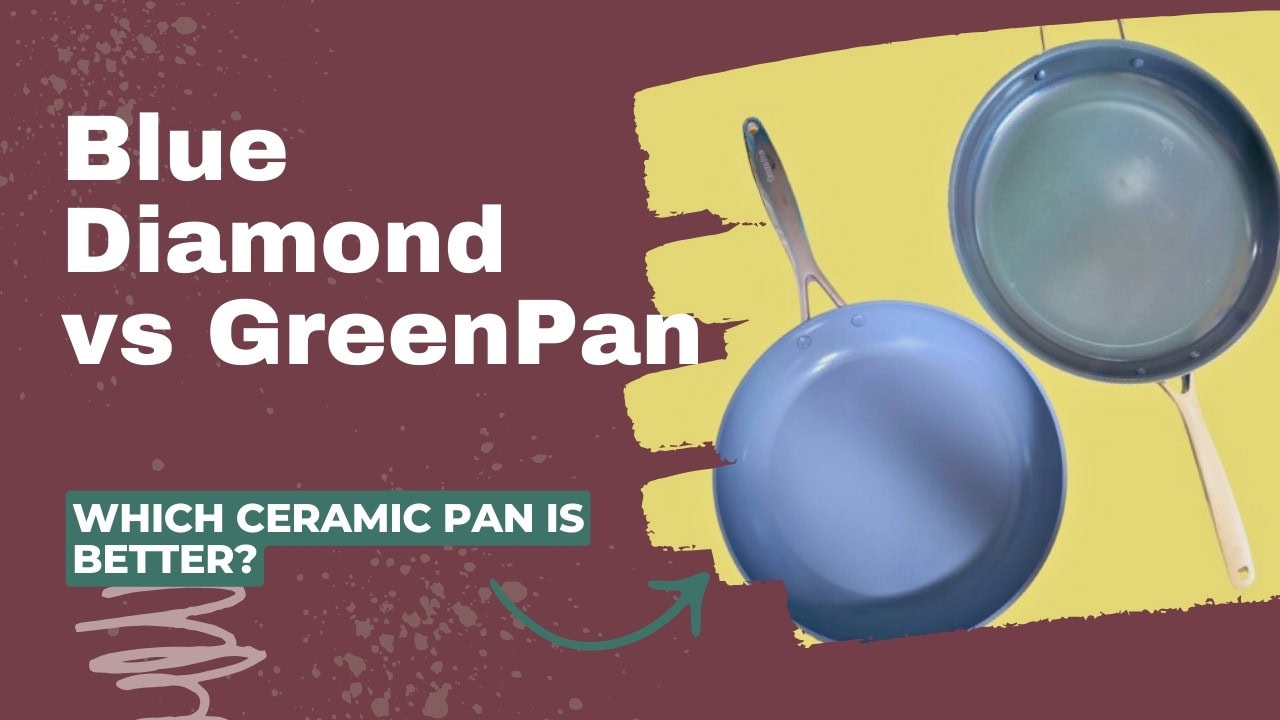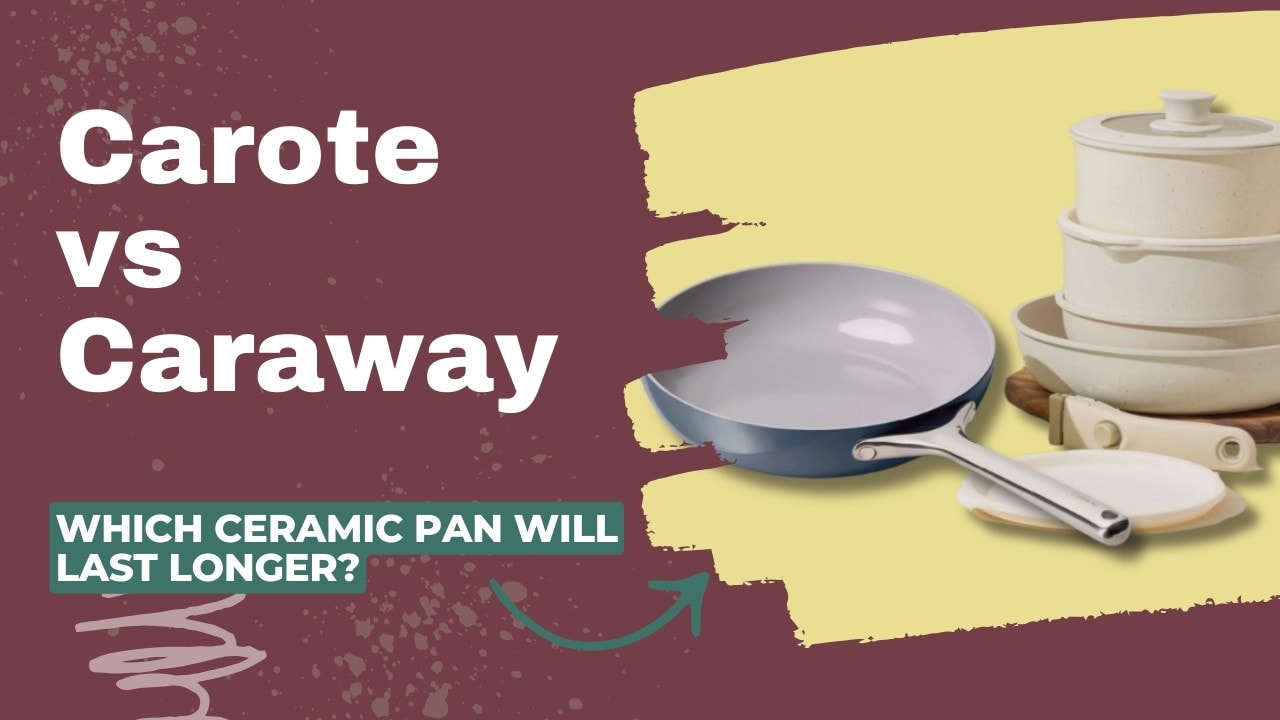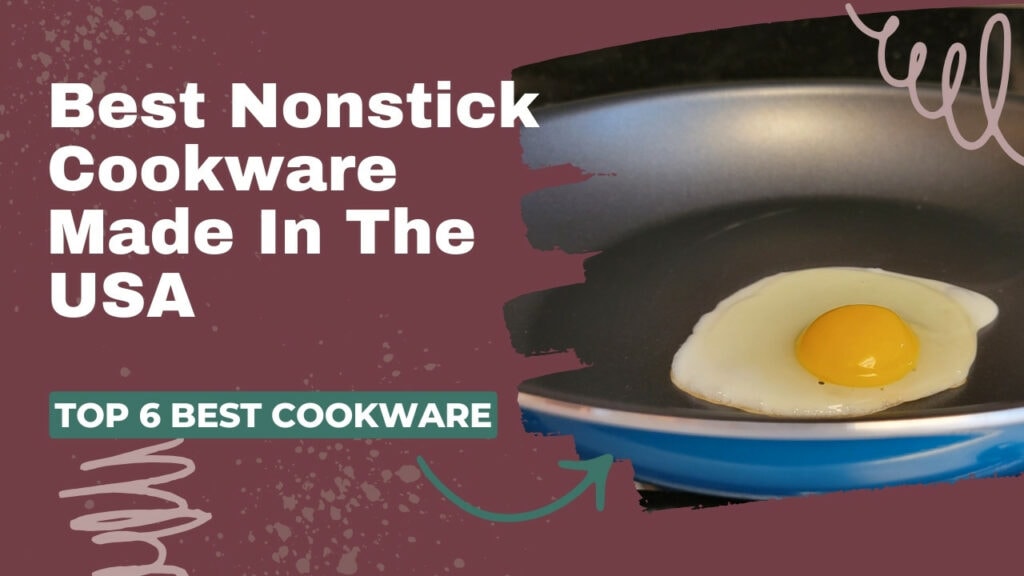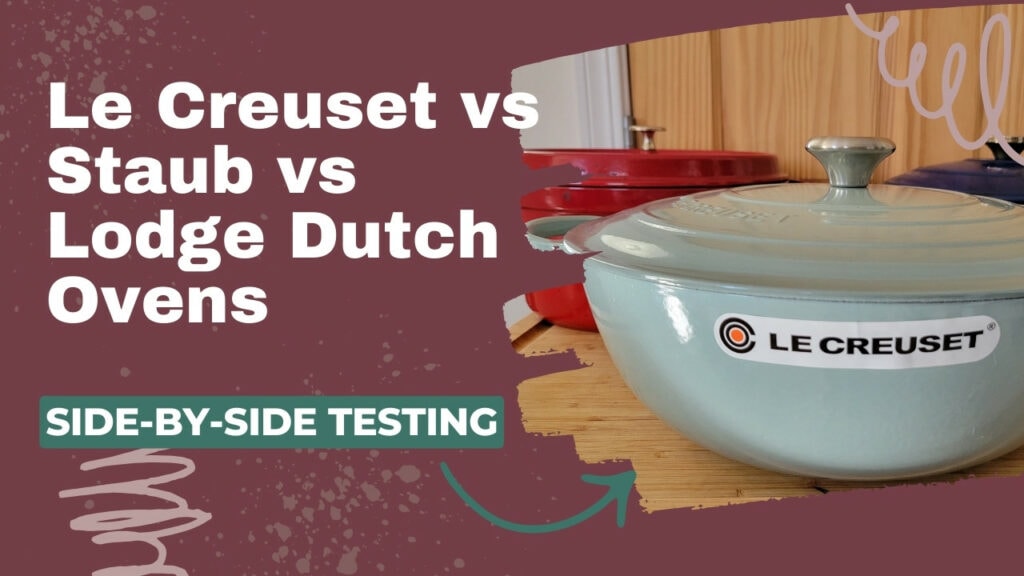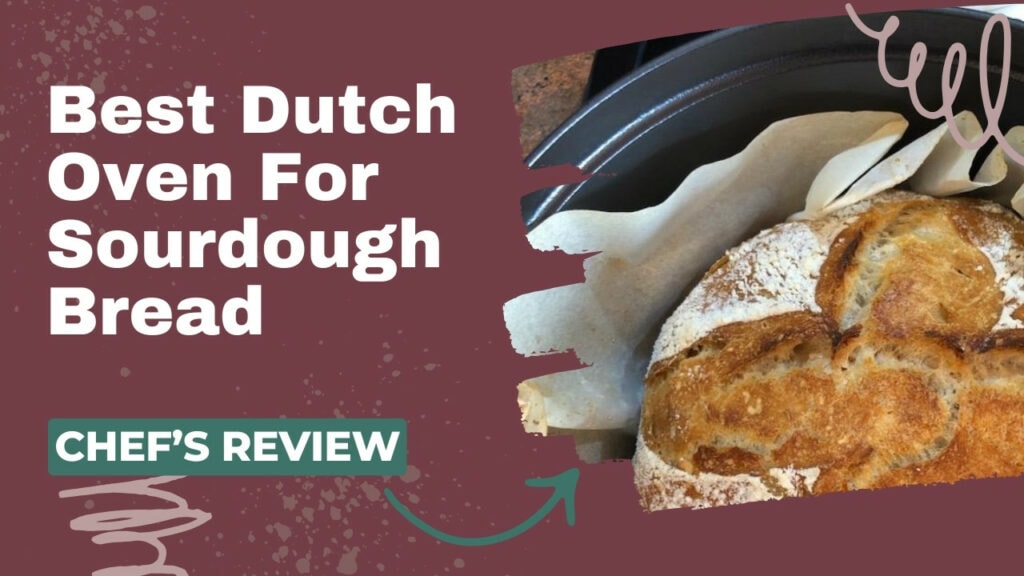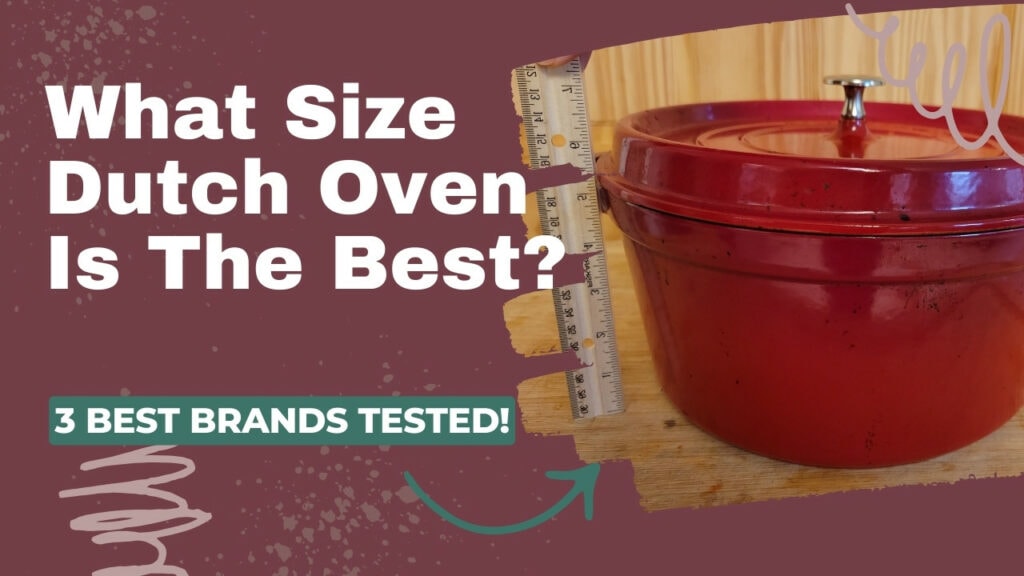DISCLAIMER: THIS PAGE DOES NOT PROVIDE MEDICAL ADVICE.
This page is intended for informational purposes only. No material on this page is intended to be a substitute for professional medical advice, diagnosis, or treatment. Always seek the advice of your physician or other qualified healthcare provider before changing your dietary or cooking habits.
Ok, I’ll admit it, I’m obsessed with my Dutch oven! I love to slow cook, so I crack out my Dutch oven on a weekly basis to braise lamb shanks or make hearty soups.
Dutch ovens are thick-walled cooking pots with tight-fitting lids used on a stovetop or in the oven. They are often used in long and slow cooking methods. This prolonged cooking time means that harmful metals or chemicals – if they’re present in the cookware – have plenty of time to leach into your food, which is why it’s essential that your Dutch oven is nontoxic.
In this article, we’ll take a look at the best nontoxic dutch ovens so that you can cook with peace of mind.
Our Top Picks
- Best Non-Toxic Dutch Oven – Staub Cocotte
⬇ Jump to review - Best Non-Toxic Ceramic Clay Dutch Oven – Emile Henry
⬇ Jump to review - Fan Favorite Enameled Cast Iron – Le Creuset French Oven
⬇ Jump to review - Best Cast Iron Dutch Oven – Lodge
⬇ Jump to review - Best Affordable Dutch Oven – Lodge Enameled Cast Iron
⬇ Jump to review - Best Ceramic Coated Dutch Oven – Caraway
⬇ Jump to review - Best Stainless Steel Dutch Oven – All Clad D3
⬇ Jump to review
At The Skillful Cook, we’ve done extensive research into cookware safety. We’ve tested several top brands of Dutch ovens hands-on, and we’ve interviewed manufacturers regarding their safety and regulation compliance. In this article, I’ll share what we’ve learned so you can pick the perfect one for you.
The Best Non-Toxic Dutch Oven
If you want to buy a nontoxic dutch oven, Staub is your safest bet. Staub Dutch ovens are manufactured in France in adherence to FDA and California Prop 65 standards. Their Dutch ovens do not contain Teflon.
These are heirloom pieces that will last you a lifetime.
What Dutch Oven Materials Are The Safest?
The best generally nontoxic materials for Dutch ovens include enameled cast iron, cast iron, pure ceramic, ceramic nonstick, and stainless steel. Look for a Dutch oven from a company that produces cookware in compliance with FDA, California Prop 65, and/or EU regulations and is transparent regarding third-party lab testing of its products.
At the end of the day, there is no one-size-fits-all best nontoxic cookware; all the materials have their pros and cons. From my research, I believe the Dutch ovens on this list are among the safest ones available, most likely to be free of lead, cadmium, PTFE, and other metals or chemicals that you don’t want in your cookware.
Best Nontoxic Dutch Ovens to Buy
Staub Cocotte Cast Iron Dutch Oven- Best Non-Toxic Dutch Oven
The Staub Cocotte is made of cast iron with a porcelain enamel finish on the inside and out. The glass-like enamel prevents the iron from reacting with acids in your food, making it safe for cooking even tomato-based dishes.
Lead and cadmium were traditionally used to create the shiny finish in ceramics, and traces of these heavy metals may be found in some brands of enameled cookware today. Not so with Staub.
Staub cookware, according to the brand, is not just “lead-safe” (meaning it doesn’t contain lead that can leach into your food), but truly “lead-free,” meaning it is manufactured without lead at all. Consumer tests, even with XRF devices, seem to bear this out.
We reached out to Staub USA for a comment. This was the brand’s response to our editor on social media:
“Staub is Cadmium Free, Lead-Free, PFOA Free, PTFE Free and California Proposition 65 compliant.”
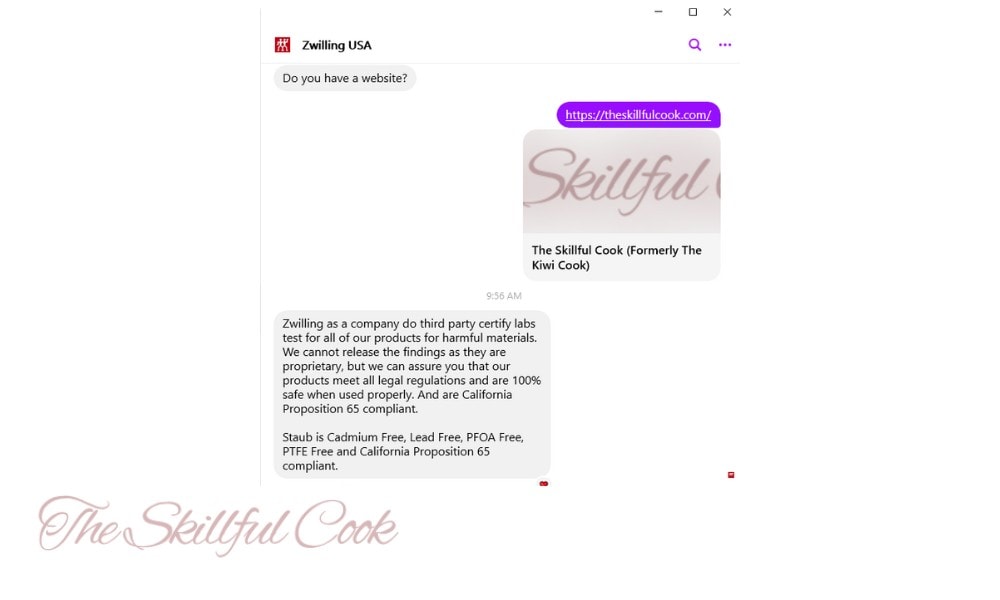
In addition to its safety, there are lots of other reasons to love Staub! It’s induction-compatible, beautiful, and had the best cooking performance in our Dutch oven tests. The black enamel inside is textured with quartz for better browning. Its self-basting lid makes it the ideal bread-baking vessel. The replaceable shaped handles on this pot add a touch of joy to your kitchen.
Quick Overview:
Pros
Cons
Emile Henry Ceramic Dutch Oven- Best Pure Ceramic Dutch Oven
Emile Henry’s HR (High Resistance) Ceramic pieces are made in Burgundy, France, with the region’s native clay. There is no metal in this pot – it’s made entirely of natural clay with a totally lead-and-cadmium-free glaze. All materials are food-safe and meet or exceed EU and US cookware regulations, including California Prop 65.
We typically think of ceramics as being breakable – and you do need to be careful with the Emile Henry Dutch oven. However, the company claims that these pieces can go in the oven to 500F, the freezer, and the microwave. Some are safe for stovetop use. Emile Henry says its commercial clay pieces are dishwasher safe beyond 2000 cycles. Products for home use come with a 10-year warranty
Quick Overview:
Pros
Cons
Le Creuset Signature Enameled Cast Iron French Oven – Fan Favorite Enameled Cast Iron
I have cooked with a lot of Dutch ovens in my career, so I can say that, without a doubt, Le Creuset’s Signature Enameled Cast Iron Dutch Oven is one of the best. One customer called it their ‘desert island pot’ after still proving reliable after years of use. Le Creuset is known for its lighter-weight, lower-carbon cast iron covered in the most luxuriously colored enamel on the planet.
But is Le Creuset safe? Is it lead-free? At The Skillful Cook, we did an entire article on this controversial topic, and I’d encourage you to check that out for the full discussion.
In short: Le Creuset did not respond to our requests for comment on whether their products are made entirely without lead. However, since they are made in France and sold in the US without a California Prop 65 warning, modern Le Creuset products meet EU and FDA standards for leachable lead and other chemicals of concern. (You should have vintage Le Creuset lab tested for heavy metals, though!)
Like other enameled cast iron options, Le Creuset is nonreactive to acidic foods and free of Teflon (PTFE), PFA, and PFOA. They are induction-compatible and available in an extensive size range.
Quick Overview:
Pros
Cons
Lodge Cast Iron Dutch Oven- Best Cast Iron Dutch Oven
The downside of non-enameled cast iron is that it needs maintenance. You will need to You will need to clean it well, dry it, and season it between every use. The seasoning oils can build up on the exterior of the pot and stain surfaces.
Cast iron will leach small amounts of iron into your food, but there are very few toxicity concerns with this material. Its major downside is that it will react with acidic foods. Since I like to stew tomatoes in a Dutch oven, I usually prefer enameled cast iron like Staub or Le Creuset.
One feature of this pot that I love is that the lid converts into a skillet. This and its general durability make this pot perfect for cooking on a fire and going camping.
Quick Overview:
Pros
Cons
Lodge 6-qt Enameled Cast Iron Dutch Oven- Best Budget Dutch Oven
Unlike the brand’s uncoated cast iron, Lodge enameled Dutch ovens are made in China. Lodge products are California Prop 65 compliant, although the brand has not made a clear statement in recent years on the quality control procedures of its products made in China.
Like Staub and Le Creuset, Lodge enameled cast iron is made without synthetic polymers and is nonreactive. This means it’s safe to store any culinary creation in it, no matter how acidic. Simply let the Dutch oven fully cool before popping it in the fridge for later.
Quick Overview:
Pros
Cons
Caraway Nonstick Ceramic Dutch Oven Pot with Lid – Best Nonstick Dutch Oven
In terms of longevity and heat retention, this ceramic-coated aluminum Dutch oven can’t hold a candle to the others on this list. But if you’re looking for something lighter weight and easier to wash (with a delightful appearance, too), you may be attracted to Caraway.
Caraway aluminum is not hard anodized, but it is thick enough to resist denting. Many people have concerns about aluminum toxicity from cookware, but the aluminum in this pot should not come in contact with your food unless it is badly chipped or scratched. The proprietary ceramic (sol-gel) coating is made of natural materials; most brands use silica with other minerals, but Caraway doesn’t tell us exactly what’s in its coating.
We do know that the ceramic coating is free from Teflon (PTFE) and the “forever chemicals” associated with it. Caraway markets its products as being better for the environment, with less CO2 produced to create its coating than to produce traditional nonstick pans.
In my experience, Caraway lasts longer than competing brands like Blue Diamond. However, it’s still going to need to be replaced within 5 years – so it’s not really as environmentally friendly as cast iron pans that will last decades.
Caraway is one of the few ceramic nonstick brands to offer a Dutch oven.
Quick Overview:
Pros
Cons
All Clad D3 Stainless Steel Dutch Oven- Best Stainless Steel Dutch Oven
This All Clad D3 Stainless Steel Dutch Oven is a more rare option made from stainless steel. Stainless steel is considered a non-toxic cooking material because it’s free from lead, cadmium, and chemical polymers. The major concern that some people have about stainless steel is that it usually includes nickel in the metal alloy. (Although you can find a few nickel-free options.)
The All Clad D3 line has an aluminum core that heats the pan quickly and evenly. The 18/10 stainless steel inside that is durable and great for searing. This material is long-lasting and doesn’t require maintenance like seasoning, which is a huge selling point.
If you are a fan of stainless steel, All Clad is one of the best on the market. But for a Dutch oven, stainless steel isn’t my first choice.
This material doesn’t retain heat as efficiently as cast iron or pure ceramic, which is one of the main functions of a Dutch oven in my eyes. So, I would recommend going with one of the enamel cast iron options instead.
Quick Overview:
Pros
Cons
How to Choose a Non-Toxic Dutch Oven
What is a Dutch Oven?
A Dutch oven is a thick-walled cooking vessel with a tight-fitting lid. It’s designed to be used on the stovetop and in the oven.
The best thing about Dutch ovens is their versatility. They can be used for baking, boiling, slow-cooking, and even cooking on an open fire. Since they are subjected to intense heat and long cooking times, it is vital that the cooking vessels are nontoxic and won’t leach any harmful chemicals under these conditions.
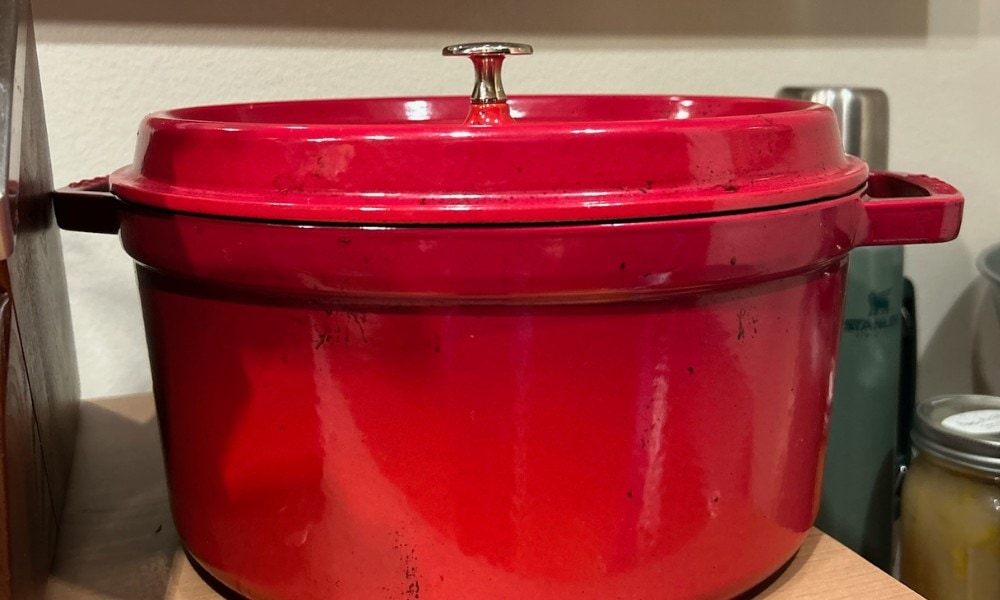
What are the Safest Cookware Materials?
As you can see from our product rundown, there are a few material options for safe Dutch ovens, so let’s look at these options in a little more detail. For a complete guide and comparison between all cookware material, check out our article here.
Cast iron
Raw cast iron is an old material that has been in use for cookware around 680 AD. Dutch ovens are often made from this material because of its superior heat retention. But it is very reactive to acidic foods like tomatoes and lemons.
Almost all brands of cast iron are safe, since they have nearly the same elemental makeup no matter what the brand.
✅ Oven safe to up 500°F
✅ Stacks up to save space
✅ Highly durable
Enamel Cast Iron
Enameled cast iron has the wonderful heat retention qualities of cast iron without any of the reactivity. The raw cast iron is covered in two layers of enamel to seal it in to prevent leaching and make it non-reactive. Some users have concerns about lead and cadmium used in porcelain enamel glazes – I explore the topic in more detail at this article: Is enameled cast iron safe?
From our research, we believe Staub to be one of the safest brands of enameled cast iron Dutch ovens.
✅ Oven safe to up 500°F
✅ Good heat distribution
✅ Highly durable
✅ Compatible with induction stovetops
Pure Ceramic/ Stoneware
Pure ceramic and stoneware are similar materials made from glazed, nonporous clay. (Check out our article on the difference between stoneware and ceramic.) This is not to be confused with ceramic-coated metal cookware, which is simply metal cookware coated in a silica-based nonstick coating that resembles ceramic.
For pure ceramics, I recommend
✅ 100% Ceramic
✅ Oven & Dishwasher safe
✅ Stylish Textured Exterior
✅ Modern Lid Design
✅ Even heat distribution
What Brands of Dutch Ovens Have the Highest Safety Standards?
When it comes to high-quality Dutch ovens that go through thorough testing, I recommend Emile Henry, Le Creuset, Lodge, and Staub. All of these brands have been tested under California Proposition 65 standards and passed. I would avoid any brands with Teflon-coated nonstick Dutch ovens, as the nonstick coatings are not safe when exposed to high temperatures in the oven for extended periods of time.
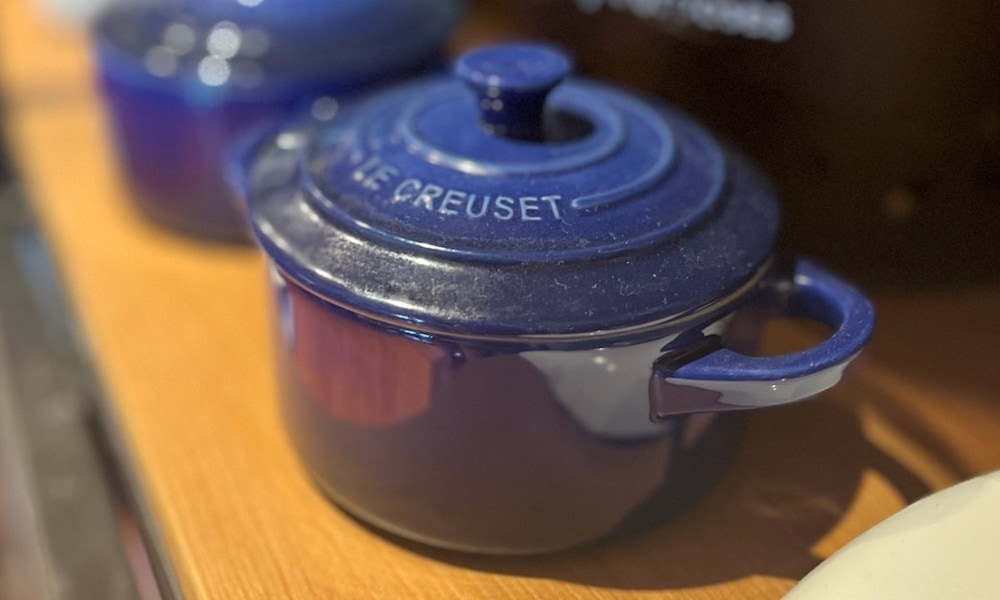
Other Features of Great Dutch Ovens
We have covered almost all there is to know about Dutch ovens at this point, but here are some key features to take into consideration.
Summary
To wrap things up, we’ve journeyed through the realm of non-toxic Dutch ovens, and hopefully, you’re now armed with the knowledge to make a deliciously informed choice. Remember, whether you opt for classic cast iron or trendy ceramic, these kitchen essentials offer a safe and hearty way to cook up your favorite dishes.
Staub claims that their products meet FDA and California Prop 65 standards, which means the oven doesn't leach heavy metals.
This Dutch oven does not use Teflon.

